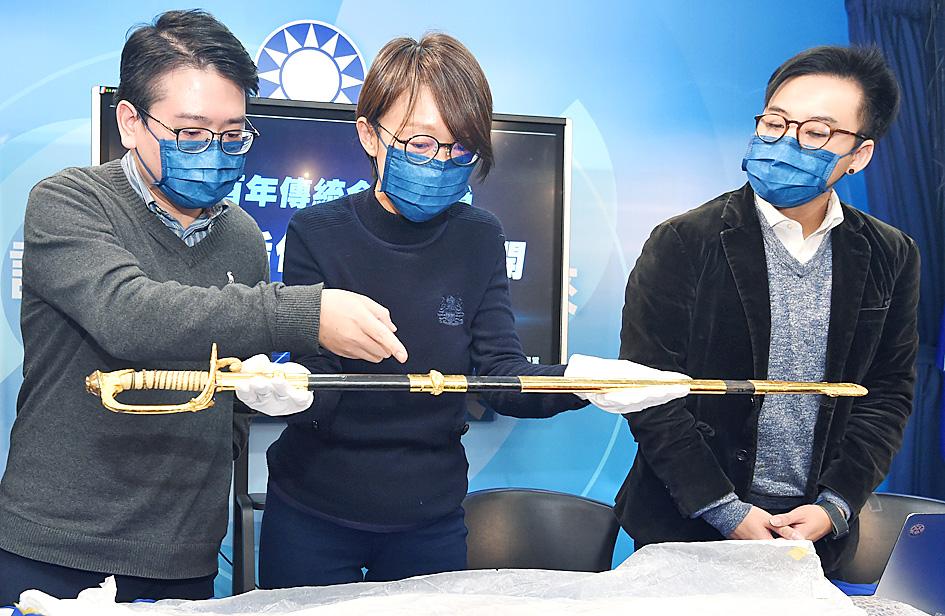The Chinese Nationalist Party (KMT) is to use non-fungible tokens (NFTs) in a bid to revitalize the party’s archives, KMT officials said yesterday at a news conference in Taipei that showcased a ceremonial sword belonging to Chiang Kai-shek (蔣介石), the first piece of the collection to be utilized in the project.
NFTs are a blockchain technology used for digital files that provide proof of ownership or a certificate of authenticity.
KMT Culture and Communications Committee deputy director-general Lin Chia-hsing (林家興), who is also the curator of the archives, said that digitizing the collection is part of the party’s efforts to revamp its image and fundraising capabilities via innovation and technology.

Photo: Liao Chen-huei, Taipei Times
The drive was authorized by the KMT Central Standing Committee in October, Lin said.
NFTs of Chiang’s sword featured at this year’s CES (formerly the Consumer Electronics Show), which was held in Las Vegas, Nevada, last week, he said.
The sword was presented to Chiang by a San Francisco-based overseas compatriot association in 1949 and its blade bears an inscription that reads: “For the suppression of rebellion and the founding of the nation,” Lin said.
Taiwan Blockchain Academia president Peng Shao-fu (彭少甫) said NFT technology could help the KMT contest Beijing’s narrative that the Chinese Communist Party battled imperial Japan during World War II.
The technology could also boost the KMT’s appeal to young people by bringing artifacts in its collection to a broader audience, helping to promote the party’s perspective on the history of the Republic of China, Peng said.
The KMT is to use NFTs as gratitude certificates for donors and the transaction fees would further bolster the party’s revenue, he said.
“Creating digital exhibits of precious artifacts in the metaverse would be particularly meaningful when starting a dialogue with young people,” Peng said.
Additional reporting by CNA

A Taiwanese software developer has created a generative artificial intelligence (AI) model to help people use AI without exposing sensitive data, project head Huang Chung-hsiao (黃崇校) said yesterday. Huang, a 55-year-old coder leading a US-based team, said that concerns over data privacy and security in popular generative AIs such as ChatGPT and DeepSeek motivated him to develop a personal AI assistant named “Mei.” One of the biggest security flaws with cloud-based algorithms is that users are required to hand over personal information to access the service, giving developers the opportunity to mine user data, he said. For this reason, many government agencies and

The National Fire Agency on Thursday said a series of drills simulating a magnitude 8.5 earthquake would be held in September to enhance the government’s emergency response capabilities. Since earthquakes cannot be predicted, only by continuously promoting disaster prevention measures could Taiwan enhance its resilience to earthquakes, agency Director-General Hsiao Huan-chang (蕭煥章) said in a news release. The exercises would be held to mark annual National Disaster Prevention Day on Sept. 21, the aim of which is to test Taiwan’s preparedness and improve its earthquake resilience in case of a major temblor, Hsiao said. As part of those drills, an earthquake alert would

DEFENSE: The National Security Bureau promised to expand communication and intelligence cooperation with global partners and enhance its strategic analytical skills China has not only increased military exercises and “gray zone” tactics against Taiwan this year, but also continues to recruit military personnel for espionage, the National Security Bureau (NSB) said yesterday in a report to the Legislative Yuan. The bureau submitted the report ahead of NSB Director-General Tsai Ming-yen’s (蔡明彥) appearance before the Foreign and National Defense Committee today. Last year, the Chinese People’s Liberation Army (PLA) conducted “Joint Sword-2024A and B” military exercises targeting Taiwan and carried out 40 combat readiness patrols, the bureau said. In addition, Chinese military aircraft entered Taiwan’s airspace 3,070 times last year, up about

STRICTER ENFORCEMENT: Taipei authorities warned against drunk cycling after a sharp rise in riding under the influence, urging greater public awareness of its illegality Taipei authorities have issued a public warning urging people not to ride bicycles after consuming alcohol, following a sharp rise in riding under the influence (DUI) cases involving bicycles. Five hundred and seven people were charged with DUI last year while riding YouBikes, personal bicycles, or other self-propelled two-wheelers — a fourfold increase from the previous year, data released by the Taipei Police Department’s Traffic Division showed. Of these, 33 cases were considered severe enough to be prosecuted under “offenses against public safety,” the data showed. Under the Road Traffic Management and Penalty Act (道路交通管理處罰條例), bicycles — including YouBikes and other